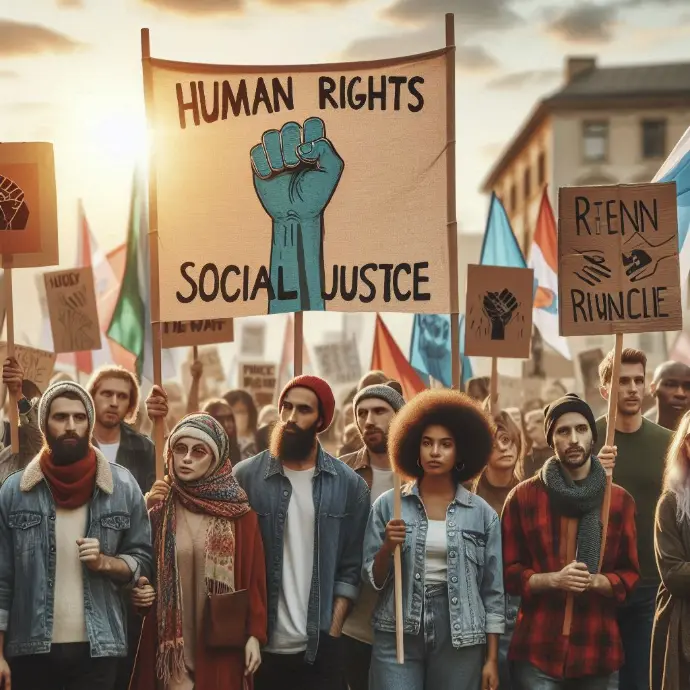



Understanding Human Rights: A Legal Framework for Committed NGOs
In this space, you'll find everything you need to strengthen your nonprofit's impact. Our feature article, "Understanding Human Rights: A Legal Framework for Committed NGOs," will guide you through the complex world of the legal framework for NGOs, providing you with the tools you need to effectively achieve your goals. Explore, learn, and make your commitment generate real change!
Introduction
Human rights are those rights inherent to all human beings, regardless of nationality, place of residence, sex, national or ethnic origin, color, religion, language, or any other status. These rights are interdependent, interrelated, and indivisible, meaning that they cannot be fully enjoyed if any of the other categories of human rights are violated. Human rights include civil and political rights, such as the right to life, freedom of expression, and equality before the law, as well as economic, social, and cultural rights, such as the right to work, education, and participation in cultural life.
The Universal Declaration of Human Rights, adopted by the United Nations General Assembly in 1948, is the principal document that sets forth the fundamental human rights of all peoples and nations.
Human rights are the foundation of justice, peace, and equality in the world, and their respect and protection are fundamental to the functioning of democratic societies and sustainable development.
For committed NGOs, the defense and promotion of human rights are fundamental to their work. By focusing on the protection of people's fundamental rights, NGOs contribute to building societies that are more just, equitable, and respectful of human dignity. Nonprofit organizations play a crucial role by advocating for the fulfillment of human rights, providing assistance to people whose rights have been violated, and advocating for changes in policies and practices that affect vulnerable communities.
The defense of human rights is a central pillar of NGO activities, allowing them to address a wide range of issues, from social justice and gender equality to the protection of the rights of children, minorities, and other marginalized or vulnerable groups.
Furthermore, for committed NGOs, respecting and promoting human rights is essential to gaining the trust of the communities they serve and establishing strong relationships with governments, other organizations, and donors.
The international legal framework plays a crucial role in the work of committed NGOs, as it provides the legal foundation for their work. International human rights norms and treaties, as well as other legal provisions at the regional and international levels, set standards for the protection and promotion of human rights worldwide.
For NGOs, the international legal framework serves as a tool to advocate for change, pressure governments to comply with their human rights obligations, and provide legal recourse for victims of human rights violations.
Furthermore, the international legal framework provides NGOs with guidance and support in the planning and implementation of their programs and projects, ensuring that their actions are aligned with globally established human rights principles and standards.

Background on the Legal Framework for Committed NGOs
The historical development of human rights at the international level has been a fundamental process for the protection and promotion of the fundamental rights of all people. This process dates back to the Universal Declaration of Human Rights, adopted by the United Nations General Assembly in 1948, which established a significant milestone by recognizing the inalienable rights of every person, regardless of nationality, race, religion, or any other status.
Since then, the international legal framework has evolved with the adoption of numerous treaties, conventions, and protocols that seek to guarantee the respect and protection of human rights worldwide. These legal instruments have laid the foundation for the work of NGOs committed to promoting human rights, providing them with a solid legal basis for their work in favor of justice and equality.
It is important to understand the historical development of human rights at the international level to appreciate the importance and impact of the legal framework on the work of NGOs committed to this cause. The evolution of this legal framework provides a significant context for understanding the relevance and scope of NGO work today.
Today, the international legal framework for committed NGOs takes on crucial relevance in a global environment marked by significant human rights challenges. NGOs play a fundamental role in defending fundamental rights around the world, addressing issues such as social justice, gender equality, the protection of vulnerable groups, and the promotion of freedom of expression.
The legal framework provides NGOs with a legal basis to carry out their work in national and international settings, ensuring that their work is based on legally recognized and endorsed principles. Furthermore, this framework provides NGOs with the necessary tools to advocate for compliance with international human rights treaties and conventions, thus strengthening their capacity to generate a significant impact on society.
In a context where organizations face challenges and obstacles in promoting human rights, the legal framework becomes a fundamental pillar that supports the work of committed NGOs, providing a solid foundation for their action and defense of fundamental rights.
There are several international treaties and conventions that are of particular relevance to NGOs committed to defending human rights. These include the Convention on the Rights of the Child, the International Covenant on Civil and Political Rights, the International Covenant on Economic, Social and Cultural Rights, and the Convention on the Elimination of All Forms of Discrimination against Women, among others.
These legal instruments establish standards and obligations that States must comply with in relation to human rights, while also providing NGOs with a solid framework to guide their work and promote the effective implementation of these treaties at the national and international levels.
An understanding of these treaties and conventions is essential for committed NGOs, as it allows them to base their work on universally recognized and endorsed legal principles. It also gives them the ability to influence public policymaking and hold States accountable for human rights, thus strengthening their contribution to promoting more just and equal societies.
Human rights are protected and promoted internationally by several specialized agencies. One of the most important is the United Nations (UN), which includes the Office of the United Nations High Commissioner for Human Rights (OHCHR). This office works closely with States, civil society, non-governmental organizations, and other actors to promote and protect human rights worldwide.
Another key body is the International Court of Justice (ICJ), the principal judicial organ of the United Nations. The ICJ is responsible for deciding legal disputes between States and issuing advisory opinions on legal issues. Its work is fundamental to the interpretation and application of international human rights treaties and principles.
Furthermore, the Inter-American Commission on Human Rights (IACHR) is a principal and autonomous body of the Organization of American States (OAS), responsible for the promotion and protection of human rights in the Americas. This commission ensures respect for and protection of human rights in OAS member countries, and its decisions and recommendations are of great international relevance.
National and Local Legislation for Committed NGOs
One of the main concerns for committed NGOs is the adaptation of national legal frameworks to the international human rights framework. It is crucial that national laws are aligned with international treaties and conventions to ensure that human rights are respected and protected at all levels. Specialized consulting can help NGOs understand how these two legal spheres relate and how to comply with international standards while operating within a national legal framework.
Local regulations are of utmost importance for committed NGOs, as they establish the specific rules and regulations they must follow when carrying out their work. These regulations range from registration and reporting requirements to tax restrictions and obligations. It is critical that organizations are aware of these local regulations and have the support of legal experts who can guide them in complying with them.
The impact of national legislation on the work of committed NGOs is significant. Local laws and regulations can influence organizations' ability to implement programs, raise funds, recruit staff, and collaborate with other entities. NGOs' deep understanding of national legislation and their ability to adapt to legal changes are critical to ensuring their effectiveness and long-term sustainability.
Practical Application of the Legal Framework in Committed NGOs
The incorporation of human rights into the structure of committed NGOs is a fundamental process that involves the adoption of internal policies, staff training, and the integration of a human rights-based approach into all activities and programs. This includes the promotion of non-discrimination, gender equality, respect for cultural diversity, and the inclusion of persons with disabilities. It is crucial that NGOs have mechanisms to monitor and evaluate the impact of their actions related to human rights, thus ensuring that international standards are met in all areas of their work.
Furthermore, collaboration with partners and strategic allies, including other NGOs, government agencies, and international organizations, is essential to strengthen the incorporation of human rights into the organizational structure and the implementation of projects and programs. This collaboration can facilitate the exchange of good practices, access to resources, and influence in policymaking at the local, national, and international levels.
Finally, transparency and accountability are key pillars in the process of mainstreaming human rights in committed NGOs. The publication of reports and participation in monitoring and evaluation mechanisms are mechanisms that contribute to the legitimacy and positive impact of NGO actions on the fulfillment of human rights.
The legal framework for committed NGOs provides fundamental guarantees for the development of humanitarian projects and actions in the context of human rights. This includes the recognition and protection of freedom of association and expression, the right to citizen participation, the protection of human rights defenders, and access to resources and funding for activities related to the promotion and defense of human rights.
Furthermore, the legal framework establishes clear responsibilities and obligations for committed NGOs regarding accountability, transparency in the management of resources, respect for local and international legislation, and compliance with ethical and human rights standards in all phases of their humanitarian projects and actions.
The existence of a solid legal framework provides legal certainty to committed NGOs, strengthening their capacity to operate effectively and sustainably, and to advocate for political, social, and economic changes that promote and protect human rights in their communities and globally.
While the legal framework for committed NGOs provides important guarantees and protections, its implementation can face significant challenges and obstacles. These include a lack of recognition or respect from governments or non-state actors, restrictions on freedom of association and expression, threats to the safety and integrity of human rights defenders, bureaucratic and administrative obstacles to the registration and operation of NGOs, and the stigmatization or criminalization of their activities.
Furthermore, a lack of financial resources, a lack of technical and management capacities, and limited community participation in decision-making represent additional challenges to the effective implementation of the legal framework for committed NGOs. These challenges require concerted strategies and actions at the local, national, and international levels to promote legal reforms, strengthen the protection of human rights defenders, and ensure equitable access to resources and funding for NGOs committed to promoting and defending human rights.
NGOs committed to defending human rights have made significant legal progress over the years. A clear example of this is the NGO Human Rights Watch, which has played a fundamental role in promoting and defending human rights around the world. Thanks to its research and documentation work, this organization has contributed to the creation of international legislation that protects the fundamental rights of people in vulnerable situations.
Another notable case is that of Amnesty International, an NGO that has worked tirelessly for the abolition of the death penalty and the protection of the rights of migrants, refugees, and asylum seekers. Through awareness-raising campaigns, strategic litigation, and political lobbying, Amnesty International has successfully influenced the adoption of laws and policies that guarantee the protection of human rights in various countries.
These successful experiences demonstrate that committed NGOs can have a significant impact in the legal field, driving legislative reforms, promoting government accountability, and contributing to the creation of a more just and equitable legal framework for all.

Social and Political Impact of the Legal Framework on Committed NGOs
The legal actions carried out by committed NGOs have a profound influence on society and the political environment. By operating within a solid legal framework, these organizations can effectively advocate for human rights, influence public policy, and generate a significant impact on the community in which they operate.
Transparency and accountability, fundamental to the legal framework of committed NGOs, contribute to strengthening society's trust in these organizations. This, in turn, can foster greater citizen participation and awareness of human rights, generating a positive impact on society as a whole.
In the political sphere, the legal actions of committed NGOs can challenge established power structures, promoting the adoption of more just and inclusive policies. Furthermore, by operating within a solid legal framework, these organizations can exert pressure on governments and other entities to ensure respect for human rights and the protection of the most vulnerable groups.
The legal framework within which committed NGOs operate plays a fundamental role in their ability to influence public policy. By operating within established legal boundaries, these organizations can actively participate in consultation and policymaking processes, contributing their experience and expertise to promote measures that favor respect for and protection of human rights.
Furthermore, the legal framework can grant committed NGOs the necessary status to access decision-making spaces, allowing them to represent the interests of the communities they serve. Likewise, legal provisions protecting freedom of expression and freedom of association are essential for these organizations to carry out their advocacy work effectively and without fear of reprisals.
In this sense, the legal framework provides committed NGOs with the necessary tools to advocate for public policies that promote equality, social justice, and respect for human dignity, thus contributing to the construction of more equitable and democratic societies.
Committed NGOs play a crucial role in the promotion and defense of human rights at the national and international levels. Their tireless work in areas such as education, legal assistance, awareness-raising, and political advocacy contributes significantly to the protection and advancement of the fundamental rights of all people.
With the support of the legal framework, committed NGOs can take concrete actions to expose human rights violations, provide support to victims, and advocate for legislative changes that strengthen human rights protection. Furthermore, their work in raising awareness and educating civil society contributes to the creation of a culture of respect for and promotion of human rights in all spheres of society.
At the international level, committed NGOs can pressure States and international organizations to comply with their human rights obligations, promoting the adoption of concrete measures to prevent violations and ensure justice and reparation for victims.
Conclusions
Understanding the legal framework is critical for committed NGOs, as it enables them to operate ethically, transparently, and efficiently. By having a thorough understanding of the laws and regulations governing their field of work, these organizations can ensure that their activities are aligned with human rights principles and that they comply with relevant legal obligations.
Furthermore, understanding the legal framework empowers NGOs to more effectively advocate for the rights of the people they serve. By knowing their legal rights and responsibilities, nonprofits can empower themselves to defend the interests of vulnerable communities and work toward social justice.
Finally, understanding the legal framework also enables NGOs to avoid potential legal conflicts and maintain their reputation, which is crucial for maintaining the trust of donors, supporters, and beneficiaries.
The future of NGO work in the legal field presents both significant challenges and opportunities. On the one hand, the legal environment in which these organizations operate can be complex and subject to constant change, requiring continuous adaptation and constant updating of legal knowledge.
On the other hand, technological advancement and globalization offer opportunities for NGOs to expand their reach and effectiveness, but also pose challenges in terms of data protection, cybersecurity, and legal aspects related to their online presence.
Furthermore, the growing focus on accountability, transparency, and good governance provides NGOs with the opportunity to strengthen their work through the adoption of stricter legal standards, which in turn can improve their credibility and long-term sustainability.

 IHRO NEWS
IHRO NEWS